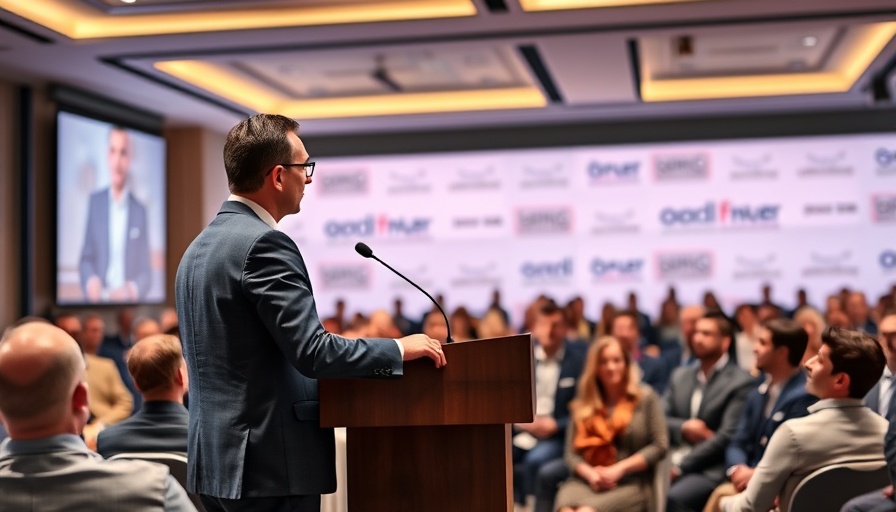
Driving the Circular Economy: Insights from the Era Conference
The Era Conference hosted in Cape Town on October 13, 2025, emerged as a significant platform promoting the principles of the circular economy, especially regarding Waste Electrical and Electronic Equipment, Lighting, and Batteries (WEEEL&B). Led by a diverse array of industry experts and highlighted by an impactful keynote from Mishelle Govender of the Department of Forestry, Fisheries and the Environment (DFFE), the conference addressed critical challenges and showcased innovative solutions necessary for a sustainable future.
The Regulatory Landscape: A Catalyst for Change
Govender's keynote not only spotlighted the regulatory landscape but underscored the urgency of transitioning to a zero-waste context, particularly under the Extended Producer Responsibility (EPR) framework. This regulation commands producers to manage the lifecycle of their products, a paradigm shift that can foster a culture of sustainability in South Africa. Such measures are essential not only for compliance but also for reducing carbon emissions—significantly aligned with global targets under the Paris Agreement.
Panel Discussions: Bridging Policy and Practice
Two distinct panels galvanized thinking around waste management: one focusing on innovative pathways to achieving a “Zero Waste to Landfill” approach and the other on unlocking the socio-economic potential of circularity. As the conference revealed, integrating renewable energy solutions, including solar power and biomass energy, into waste management practices is paramount. The discussions illustrated how critical infrastructure, such as smart grids and microgrids, can incorporate these resources effectively.
The Promise of E-Waste Management
The growing e-waste crisis demands effective handling and recycling strategies to mitigate environmental hazards. According to the EWaste Africa organization, focused regulatory efforts have encouraged collaborative recycling initiatives, such as their drop-off points across Pick n Pay supermarkets. Estimates suggest that only 7-10% of e-waste is currently being recycled in South Africa, presenting a significant opportunity for growth and awareness during ERA's 7 Days of Eco-Activism campaign.
Innovative Technologies: Showcasing Real Solutions
The showcase of the GeT Metal Group's solar vehicle at the conference was a vivid illustration of progress, demonstrating how sustainable engineering and innovative technologies can drive the shift away from fossil fuels. Encouragingly, this aligns with the mission of achieving an energy-efficient future while reducing greenhouse gases.
Socio-Economic Benefits: Creating Green Jobs
In line with discussions around scaling social impact, the circular economy can catalyze job creation in underserved communities. Industry leaders highlighted the need for inclusivity in eco-activism, with initiatives aiming to generate hundreds of jobs linked to the WEEEL&B sector. This commitment to local employment not only reflects sound economic policy but also drives a concerted effort towards just transition frameworks addressing energy poverty.
Challenges Ahead: Navigating Industry Regulations
Despite the promising discussions, challenges remain. Companies must adapt to the evolving regulatory environment, particularly those involved in waste management. Present at the conference were representatives from the National Energy Crisis Committee, who discussed the implications of current energy regulations and strategies to address energy security. This interaction highlighted the importance of aligning energy policies with sustainable practices to create a robust energy mix capable of meeting future demands.
Conclusion: Collaborative Efforts for Sustainability
As emphasized by Ashley du Plooy, CEO of ERA, the circular economy's success hinges on partnership and innovation. The Era Conference reinforced that with strong public-private collaboration, South Africa can transition to a circular economy effectively. Professionals engaged in this field must mobilize their networks ensure alignment towards sustainable practices, thus contributing to both local and global sustainability goals.
To stay proactive in these transformative times, industry professionals are encouraged to engage in educational programs and collaborative initiatives that promote awareness about sustainability and the circular economy. By doing so, you can play an integral role in shaping a more sustainable future.
 Add Row
Add Row  Add
Add 




Write A Comment